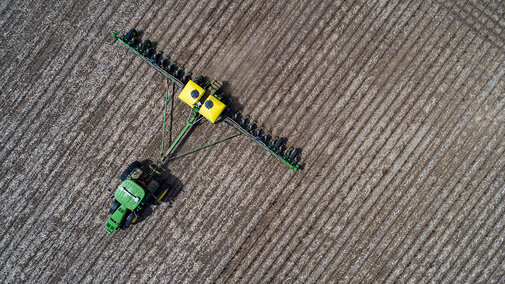Technology — from continually evolving machinery, to hybrid crops, to the capture and use of data — has transformed agriculture over the past century. Yet all of these innovations are dependent on the same thing, which has been at the heart of agriculture since its beginnings.
That thing is soil, and it’s the topic of an upcoming Soil Health Summit, which will take place from 8:30 a.m. to 3:30 p.m. Nov. 19 in the Nebraska East Union, 1705 Arbor Drive. The event is free and open to the public, but advance registration is required. Register here.
To understand the importance of soil health, one can look back at ancient Mesopotamia, in modern-day Iraq, said Ron Yoder, senior associate vice chancellor for the University of Nebraska–Lincoln’s Institute of Agriculture and Natural Resources. The region, famous for its fertile soil and advanced agricultural practices, saw much higher barley yields in ancient times than today, in large part because of nutrient loss and salinization due to poor soil management practices.
“Healthy soil should not be taken for granted,” Yoder said. “What can we do to maintain and enhance the level of soil health we have now? That will be the focus of the summit, and attendees will contribute to the discussion.”
Jerry Hatfield, retired director of the U.S. Department of Agriculture’s Agriculture Research Service Laboratory for Agriculture and the Environment, will open the summit with an overview of the science of the complex soil system and the factors that underly a healthy soil ecosystem. He will be joined by Craig Derickson, who recently retired as the Nebraska state conservationist for the USDA’s Natural Resources Conservation Service; Keith Berns, chairman of the Nebraska Soil Health Task Force; and numerous Husker faculty members who will discuss biological, chemical, environmental and physical properties of soil, as well as conservation strategies and producer practices, among other topics.
The afternoon session will be a series of discussions among attendees to establish goals for research, education and outreach to contribute to healthy soil.
Capturing broad perspectives is important, Yoder said, because soil health is a complicated issue that touches many industries, individuals and fields of study. Scientists’ understanding of how to best achieve soil health continues to evolve, as do the soil management techniques that work best for producers.
“We really want anybody with any perspective on soil health to come,” he said.
Those interested in attending can learn more or register here. Lunch and refreshments will be provided. The registration deadline is Friday, Nov. 12.

